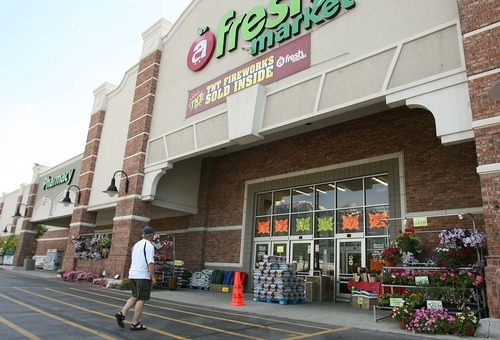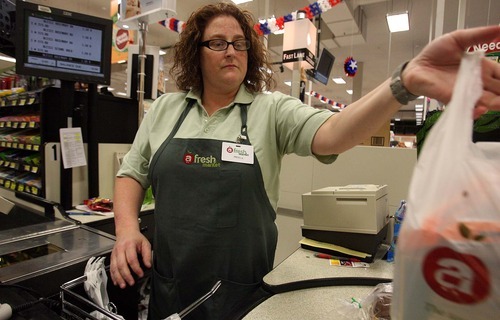This is an archived article that was published on sltrib.com in 2011, and information in the article may be outdated. It is provided only for personal research purposes and may not be reprinted.
Richard Parkinson likes to tell war stories, and when he does, he cries.
Parkinson, president and CEO of the grocery cooperative Associated Food Stores Inc., picked a U.S. prisoner-of-war story of torture and heroism for his address during the annual shareholders meeting last month in Salt Lake City.
He rose to the occasion at the Grand America Hotel, talking through tears of the sacrifices made by America's Greatest Generation. Using the Great Depression and war as a backdrop, Parkinson spoke of Associated Food's own challenges, tied to mounting losses brought about by the wholesaler's 2009 purchase of 34 Utah Albertsons' supermarkets, which were rebranded Fresh Market stores.
Parkinson cautioned against a "bunker mentality" and said better times were ahead, his words drawing a standing ovation and his faith backed by many in the cooperative. But whether there's a financial victory on the horizon for Associated Food and its 500 independent grocer-members in eight Western states is shrouded in doubt.
Red ink totaled $6.5 million in the fiscal year ending in March, in addition to the $2.3 million in losses the year before. That's compared with $2.4 million in profits prior to the Albertsons' purchase, which cost $167 million.
Among the losses was $2.2 million for store closures. Five Fresh Market locations have already been shuttered and two other corporate stores, Lin's Market in Richfield and Dick's Market in Layton, have shut down. The Lin's and the Dick's closures were attributed to increased competition from sister Fresh Market stores.
"Our system is very dynamic," said Associated Food's board chairman Monte Peterson, who also is an independent grocer in Riverton. "It is flexible enough to adapt to the needs of [our] retailers operating in the marketplace. [With them] providing valuable feedback, we will be able to gauge what is effective and make adjustments."
But one market analyst, who predicted from the get-go that Associated Food would lose money in the Albertson deal, says additional poorly performing stores will close.
"I except that they'll close or dispose of even more stores in some kind of tactful manner to avoid embarrassment," said David Livingston with DJL Research in Wisconsin. "What happened was that Albertsons wasn't a good retailer to begin with, and it was taken over by a wholesaler [Associated Food], which wasn't that experienced in running retail stores. When mediocre is taken over by mediocre, you get mediocre results."
Livingston also discounts Associated Food's claims that the battered economy is to blame for depressing Fresh Market sales. Despite the obvious challenges presented by the downturn and weak recovery, he points to the many successes of competitors such as Utah-based Harmons, which has opened stores along the Wasatch Front and has another on the way.
Despite the financial challenges and an ever-more-competitive market for grocers, Dave Davis of the Utah Food Industry Association hopes that the financial worst is over for Associated Food. He pointed to Fresh Market's recent positive cash-flow turnaround, which is a snapshot of the division's ability to meet its obligations to creditors and investors.
"In most businesses, cash flow is king," said Davis. "The good news is that from a financial perspective, the Fresh Market stores are getting on track. With pricing, there's been some distinction, and operationally they've closed down stores that were burning through the cash."
Neal Berube, president of Fresh Market division, said there also have been positive gains in weekly store sales and customer counts.
"We made a conscious decision to give every store we purchased an opportunity to turn things around," he said. "However, there were several that simply could not reach the level of performance we needed, and they had to be closed to secure the long-term viability of our entire system."
Berube is the second president of the Fresh Market chain.
The first, Dick King, recently announced his retirement. For 36 years, King was with Albertsons, where he served as president and chief operating officer before joining Associated Food in 2003. Despite his experience, he couldn't stop the losses.
One obstacle he faced was that he couldn't use the Albertson name, making it difficult to retain longtime customers. "Rebranding is tough," said Berube.
Division officials also think the losses can be blamed on missteps that confused customers. They've acknowledged that they did little advertising related to the ownership change. Some stores were stocked with new product lines before the Fresh Market signage was installed. And store grand openings were staggered, adding to customers' befuddlement.
Associated Food has operated 22 markets under four corporate-owned chains for more than a decade, and unlike the Fresh Market stores, they enjoy advantages that Fresh Market stores lack.
Corporate stores operating under the Macey's, Lin's, Dan's and Dick's banners at one time were owned by independent grocers who were Associated Food members, allowing for a better fit into the corporate culture. And unlike the Fresh Market division, these chains have their own distinctive histories, niches and loyal customer bases.
Brand loyalty has prompted Associated Food to reposition two Fresh Market stores in Lehi and Clinton with the better-known Macey's brand, whose roots trace back to 1947 in the Rose Park neighborhood in Salt Lake City.
Macey's, purchased by Associated in 1999, is known for staging community-based parties, its bakery and food-storage deals. Lin's, purchased that same year, was founded in Cedar City and caters to rural customers. Dan's, corporately owned since 2000, offers higher-end products. And Dick's, purchased in 2002, is known for its pastries, case-lot sales and, like Macey's, retains its tradition of closing on Sundays.
James Olsen, director of the Food Industry Association Executives trade group, says he's worried about how the Fresh Market stores will do in a market he believes is oversaturated with competitors, ranging from low-price chains (WinCo, Wal-Mart) to high-end stores (Whole Foods).
"The state has a good mix of chains and independents, but it's extremely competitive," he said. "This is wonderful for the customers. They've got a great variety of formats, programs and selections. But on the retail side, this is a very difficult market. With low profit margins, nobody is doing really well."
Twitter@DawnHouseTrib Associated Food Stores closes stores, consolidates
The Salt Lake-based grocery cooperative has shuttered some Fresh Market stores and closed other brand-name stores:
Fresh Market closures:
Salt Lake City, 370 E. 200 South
Salt Lake City, 140 N. 900 West
Midvale, 6989 S. 1300 East
Cedar City, 905 S. Main Street
Provo, 2255 N. University Parkway
Fresh Markets repositioned as Macey's stores:
Clinton — 2062 W. 1800 North
Lehi — 760 East Main Street
Other store closures:
Layton, Dick's Market, 88 S. Fairfield Road
Richfield, Lin's Market, 670 N. Main Street —
Associated Food's corporate-owned stores:
Fresh Market; 27 stores; Salt Lake, West Valley, Taylorsville, Murray, Sandy, Draper, Riverton, Ogden, Park City, Bountiful, Centerville, Kaysville, Layton, American Fork, Provo, Spanish Fork and Logan.
Macey's, 12 stores; Sandy, West Jordan, Clearfield, Ogden, Logan, Provo, Orem, Pleasant Grove, Spanish Fork, Tooele, Clinton and Lehi.
Dan's, four stores; Salt Lake City and Cottonwood Heights.
Lin's, four stores; Cedar City, St. George, Hurricane and Overton, Nev.
Dick's, two stores; Bountiful and Centerville.



















